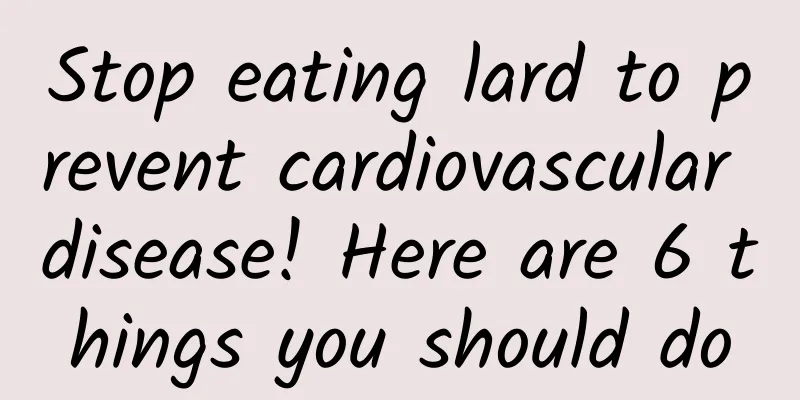Stop eating lard to prevent cardiovascular disease! Here are 6 things you should do

|
According to statistics, there are 330 million patients with cardiovascular diseases in my country, which means that one in every four people is a patient. Preventing cardiovascular diseases is urgent. In the past, if someone had cardiovascular disease, it was like having a terminal illness, and patients were rare. But now, when patients say they have high blood pressure, high blood lipids, diabetes, coronary heart disease and other cardiovascular diseases, they are very calm, thinking it is just a common cold, and they don’t take it seriously. Some people even claim that eating more lard can prevent cardiovascular disease because the older generation has been eating lard for generations and they are very healthy. Relying on eating lard to prevent cardiovascular disease is probably not reliable! To prevent cardiovascular disease, the most important thing to do is these 6 things. 1. What is the nutritional value of lard? ▲Photo: Photo Network Those who advocate eating lard argue that lard contains oleic acid, an unsaturated fatty acid that is good for health. Indeed, oleic acid is an essential fatty acid for the human body and a monounsaturated fatty acid that can lower the level of low-density lipoprotein cholesterol, which is commonly known as "bad cholesterol." "Bad cholesterol" easily deposits in blood vessels and increases the risk of atherosclerosis, so oleic acid is beneficial to cardiovascular health. However, the premise is: replacing part of saturated fatty acids with oleic acid is only meaningful under the premise of controlling saturated fatty acids. Although fat and lard are rich in monounsaturated fatty acids, for example, the monounsaturated fatty acid content of lard is 47.9g% , which is indeed higher than the corn oil, soybean oil and sunflower oil we use in daily life. However, fat and lard are also rich in saturated fatty acids that are not good for cardiovascular health. The saturated fatty acid content of lard is as high as 43.2% , while the saturated fatty acid content of corn oil, soybean oil, sunflower oil, etc. is no more than 20%, and the content of polyunsaturated fatty acids is more than 5 times that of lard. Excessive intake of saturated fatty acids can increase the risk of cardiovascular disease and death, while increasing the intake or energy supply ratio of polyunsaturated fatty acids can reduce the risk of cardiovascular disease and death. So from this perspective, it is healthier to eat less lard. If you are just interested in the monounsaturated fatty acid content of lard, you can choose peanut oil, because the monounsaturated fatty acid content of peanut oil is similar to that of lard, but the saturated fatty acid content is lower than that of lard, and the polyunsaturated fatty acid content is higher than that of lard, making it a perfect substitute for lard in cooking oil. 2. What is the most important thing to do to prevent cardiovascular disease? 1. Limit sodium intake: No more than 1 beer cap (with rubber pad) per day The latest version of the "Dietary Guidelines for Chinese Residents" recommends that each person's daily salt intake should be less than 5g , which is consistent with the recommendations of the World Health Organization and is also advocated by the "Three Reductions and Three Healths" policy. You can use a beer cap at home to weigh it, which is about less than 1 beer cap (with a rubber pad). You can also use a salt control spoon, which is sold on Taobao. The handle of the spoon will show the grams of salt. There are also small salt control spoons of 1g and 2g, which are more practical. At the same time, we should also pay attention to the hidden salt in the diet, such as pickles, kimchi, ham, sausage, noodles, etc. Some seasonings such as soy sauce, oyster sauce, hot sauce, soybean sauce, etc. are also high in salt. After eating these foods, we should pay attention to reducing the intake of salt. A pack of instant noodles that we often eat contains about 6g of salt, a handful of 100g of noodles contains about 4.9g of salt, 2 slices of 100g of whole wheat bread contain about 0.7g of salt, and 100g of biscuits contain about 1.3g of salt. In addition, although many snacks do not taste salty, they may have a lot of salt added to them. For example, 50g of konjac contains about 1.6g of salt, a bag of 80g of spicy strips contains about 4.3g of salt, a bag of 100g of non-fried potato chips contains about 1.7g of salt, and 10 plums (40g) contain about 3.2g of salt... The reason why they do not taste salty is most likely because a lot of sugar is added to cover up some of the saltiness. 2. Limit the intake of cooking oil: ▲Photo: Photo Network No more than 3 spoonfuls per day The "Dietary Guidelines for Chinese Residents" recommends that each person should consume 25 to 30 grams of cooking oil per day. If you are overweight, it is recommended that you keep it below 25 grams. The white porcelain spoon used for soup at home, one porcelain spoon holds about 10g of cooking oil, and don't use more than 3 porcelain spoons a day. ▲Photo: 10ml porcelain spoon "Dietary Guidelines for Chinese Residents" In addition to paying attention to the amount of oil used, it is also recommended to buy small packages and switch between different oils. ① Rich in α-linolenic acid: perilla oil, linseed oil, and sesame oil. ② Rich in linoleic acid: corn oil, soybean oil, walnut oil, sunflower oil, sesame oil, cottonseed oil, sesame oil. ③ Monounsaturated fatty acids: peanut oil, olive oil, tea oil, rapeseed oil. 3. Limit intake of sugary drinks: Also added sugar The "Dietary Guidelines for Chinese Residents" recommends that daily added sugar intake should not exceed 10% of total energy, and preferably not more than 5%, and the intake of added sugar should be controlled within 25g. White sugar, brown sugar, honey, rock sugar, sucrose, high fructose corn syrup, maltose syrup, corn syrup, fructose, etc. are all added sugars, and sugary drinks are beverages containing added sugar. For example, a bottle of Rock Sugar and Snow Pear, a common beverage on the market, is basically equivalent to drinking about 14 sugar cubes, which is equivalent to about 60 grams of sugar, which far exceeds the recommendations of the dietary guidelines. In addition, some dishes cooked with sugar also need attention, such as braised xx, candied xx, sweet and sour xx, sugar-added cold dishes, etc. 4. Increase dairy product intake: ▲Photo: Photo Network 300~500ml of milk per day Studies have shown that consuming two servings of dairy products per day (one serving is 244g of milk/yogurt, 15g of cheese, or 5g of butter) can reduce the risk of death from cardiovascular disease by 23% and the risk of developing the disease by 22%. It is recommended to drink milk every day. It is better if you can drink some yogurt with probiotics (sugar-free is recommended). For people with lactose intolerance, you can choose yogurt, soy milk, low-salt cheese, etc. 5. Quit smoking and limit alcohol consumption: Smoking is not good at all, drinking should be limited Smoking increases bad cholesterol in the blood and reduces good cholesterol. What is certain is that quitting smoking has absolute benefits, and it is recommended for both chronic disease patients and healthy people. As for drinking, there is actually no benefit. A study published in the world-renowned medical journal The Lancet shows that there is no safe dose of alcohol, and not drinking a drop of alcohol is the lowest health risk. A study published in The Lancet Oncology shows that 4% of all new cancer cases worldwide in 2020 were related to drinking. For many people, even small amounts of alcohol can pose serious health risks. If you must drink, limit your intake. For both men and women, it is best to limit your daily alcohol intake to 15 grams . Note that this is the grams of alcohol, not the grams of wine. Substitute the amount of alcohol you normally drink into the calculation, that is: drinking limit = 1500ml/alcohol content. See the following figure for how much common alcohol you can drink: ▲Figure: "Dietary Guidelines for Chinese Residents 2022" 6. Control your weight: BMI should be controlled between 18.5 and 23.9 BMI = weight (kg) ÷ height (m) squared. For example, if an adult is 160cm tall and weighs 50kg, then the BMI is 50 ÷ (1.6×1.6) = 19.5, which is within the standard range. If your BMI is over 23.9, it means you need to lose weight. Combining aerobic exercise with resistance exercise can significantly improve blood lipid levels. It is recommended to do aerobic exercise for about half an hour every day and strength training 2 to 3 times a week. ▲Photo: Photo Network Summarize: Don't rely on eating lard to prevent cardiovascular disease. Eating too much will increase the risk of chronic diseases . In the matter of preventing cardiovascular disease, you should seriously follow the above 6 suggestions. In addition, it is recommended to eat 1 catties of vegetables and 200-350g of fruit every day. Drink plenty of water, 1500-1700ml per day. References: [1] Yang Yuexin, Ge Keyou. Encyclopedia of Chinese Nutrition[M]. People's Medical Publishing House: Beijing, 2019: 82. [2] Chinese Nutrition Society. Dietary Guidelines for Chinese Residents. People’s Medical Publishing House. 2022 [3] Zhang Jiazhi. Application prospects of unsaturated fatty acids in the prevention and treatment of cardiovascular and cerebrovascular diseases [J]. Food Industry Science and Technology, 1999(S1):149-151. [4] Che Juan, Liu Jiao, Zhu Yufang, et al. Research progress on the relationship between saturated fatty acids and cardiovascular diseases[J]. Tianjin Medicine, 2019, 047(006):663-666. |
<<: Have you checked out these 9 kinds of autumn leaf trees this fall?
Recommend
Why is the butterfly the most perverted and cruel creature in the world? Learn about its metamorphosis
When it comes to the most perverted and cruel cre...
Fake security codes become accomplices in the “realization” of counterfeit goods
In order to avoid buying fakes, many customers of...
China Merchants New Intelligence and Juefei Technology reached a strategic cooperation to develop the digital economy and empower the construction of smart highways
With the release of the 14th Five-Year Plan and t...
The most comprehensive Baidu keyword mining method!
Method 1: Use Baidu products to mine long-tail ke...
Attention! The latest version of the carcinogen report adds 8 common substances (including a detailed list)
Written by: Zhu Hengheng Editor: Wang Haha Layout...
What will the future be like as the industry moves from functionalization to intelligentization?
Since the AI AlphaGo defeated Lee Sedol, the to...
Exclusive first test of JiRoute SOHO: Is the simple and crude WIFI enhancement solution useful?
Under the concept of "more is better" a...
User Recall and Activation: 7 Case Studies on User Loss and Activation
Activation and recall are also top priorities in ...
"Unique" bird fossils fill the 70 million-year gap in bird brain evolution|Expo Daily
Could Black Swans Become an Invasive Species in m...
How much does it cost to attract investors for the Licai Makeup Mini Program?
The advantages of WeChat mini program investment ...
Douyin unmanned live square dance, missed the cloud disco, must catch up with the cloud square dance [software + tutorial + material]
Douyin unmanned live square dance, missed the clo...
Don’t be superstitious about Growth Hacking, the source of users should come from something deeper…
[[156893]] User growth is the lifeblood of startu...
If you think Chongqing is only spicy, then you don’t know it well enough
Text | Wei Shuihua Photo | Visual China When talk...
As the most user-friendly upgrade in Android history, all the new features of Android M are here
When Dave Burke, Google's vice president of A...
Android screencaster v2.1.6 ad-free version of the entire network resource screen_no-toxic software
Android screencaster v2.1.6 ad-free version of th...









